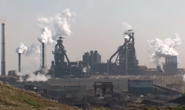Government/Policy

August 14, 2019
Nucor's Founder Predicted Long Ago That Tariffs Would Kill Steel
Written by Sandy Williams
The following editorial is by Allan Golombek, a Senior Director at the White House Writers Group, and was published on Aug. 12, 2019 by RealClearMarkets.
The steel industry should have listened to the founder of Nucor. In 1986, Ken Iverson pointed out that protectionist measures to save the American steel industry had not had the desired effect. He pointed out that only competition – from outside the United States and from emerging U.S. companies like his own – could force the industry to compete. Unfortunately, the dinosaurs of steel had other ideas.
U.S. Steel, Bethlehem Steel and Republic Steel thought they were impregnable to change, and a little government help could get them through the tough stretch. Now, two of those three companies are gone. And U.S. Steel is a shell of itself.
It is easy to see why Big Steel was so over-confident of their future success. That is what their past seemed to teach them. At the end of World War II, the U.S. steel industry was unchallenged. It produced the vast majority of the world’s steel. Its principal competitors, Japan and Germany, lay in ruins. Demand for housing and autos was great, and the federal government in Washington was spearheading construction of the interstate highway system. The American steel industry was booming.
But instead of continuing to dominate, the U.S. industry was surpassed by its competitors. The American companies stuck in the past they had dominated, hanging on to its traditional means of production. But their European and Asian competitors had little to hang on to, with their infrastructure demolished during the war. They were willing to experiment, turning iron into steel by blasting pure oxygen into molten mettle. Their productivity gains were astounding. One European factory was able to quadruple its production levels. Soon, they were introducing an even more ground-breaking way to make steel – recycling scrap in small-scale mini-mills that are cheap to build and efficient to operate.
The problem for U.S. steel companies wasn’t that European and Asian companies were competing unfairly. The problem was that U.S. companies weren’t competing, at least not according to the new rules of the road. While global competitors built new factories powered by the new methodologies, the U.S. companies just covered their eyes.
By the time U.S. steel companies started to build equivalent plants in the 1960s, it was too late.
But competition did not just come from across the oceans. Iverson had taken over Nucor, and embraced foreign methodologies and technologies. The company grew at an exponential rate, offering an inexpensive product that allowed them to beat both foreign competitors and other U.S. producers.
While the embattled steel companies of old sought to hide under the covers of government protection, Iverson pointed out that “only under competitive pressure – both internally and externally from the Japanese and Koreans – that the steel companies had been forced to modernize.”
But a more efficient industry meant fewer employees. In the 10 years starting in 1948, American steel mills averaged nearly 700,000 employees. Today, they employ just over 80,000 people. They gave way to more efficient means of production, in a domestic industry that still makes over 70 percent of the steel used domestically.
President Trump glanced at those numbers, and decided the steel industry needed to be “saved.” How have his tariffs on foreign steel fared?
More than a year after Trump slapped tariffs on imported steel, U.S. manufacturing has dropped steadily. Companies like Caterpillar say the tariffs have depressed profits, spurred layoffs and distorted supply chains, only reducing U.S. production. Auto companies have announced reduced profits and closed more plants. The cost of housing has increased.
Meanwhile, far from gaining from this protection, the U.S. steel industry is reeling. Steel prices have fallen back to pre-tariff levels. Employment is stagnant. And the stock market has given the industry a big thumbs down. Markets anticipated that Trump’s tariffs on China would push up overall prices, reduce output, and hurt sales – driving purchases of domestic inputs like steel way down.
Now, Nucor may be making the same mistake as the three dinosaurs of Big Steel. After Trump announced the steel tariffs, Nucor enthusiastically embraced it. Perhaps instead they should listen to the words of the company’s founder. Iverson warned that sheltered companies would soon become uncompetitive ones. Nucor – and the rest of the American steel industry – should heed those words.







